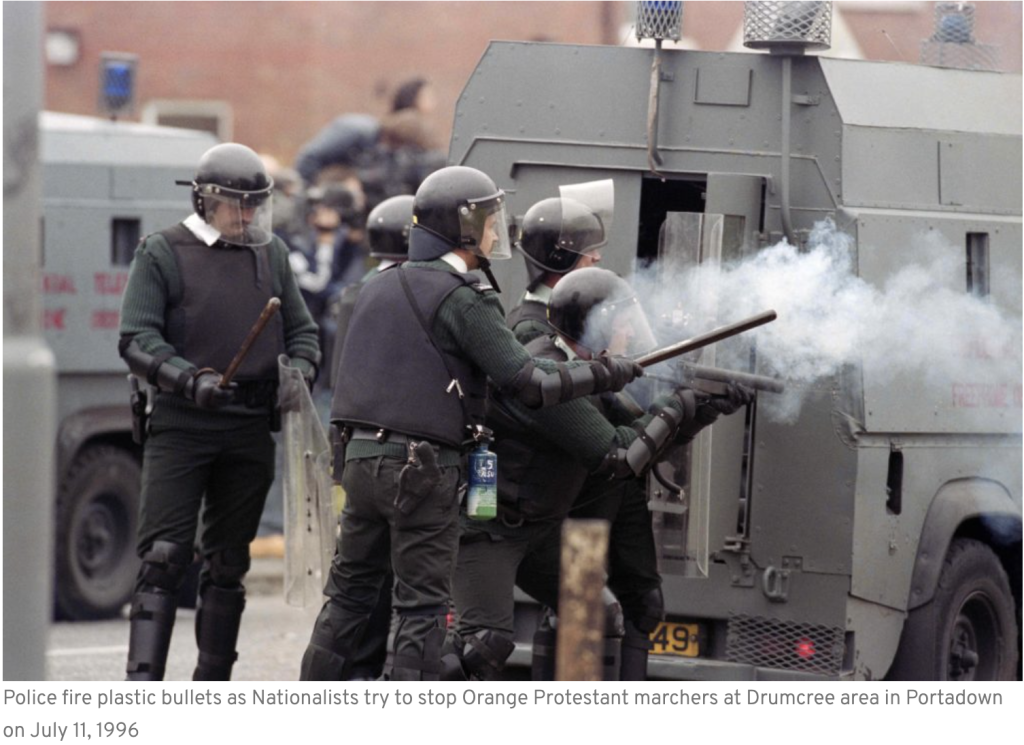THIRTY years after they ended, the capacity of Northern Ireland’s Troubles to shock us should probably have reached its limits by now.
Alas, the past bleeds into the present and two recent court cases, reported by the assiduous Belfast media, caught my eye.
The first concerned a hearing, which is set for November, concerning the importing of an arms cache for loyalist paramilitaries in the mid-1980s.
These weapons went on to be used in scores of murders during the Troubles.
Now, some of the victims’ relatives are seeking to have the Police Service of Northern Ireland (the Royal Ulster Constabulary, as it was) and the Ministry of Defence, held accountable for not stopping the weapons coming into Northern Ireland.
Instead, Patrick Frizzell (whose brother, Brian, was murdered by the UVF in 1991) and Margaret Lundy (whose husband, Alan, was gunned down by the UDA in 1993) allege that the British state assisted loyalists in procuring and importing the weapons that killed their loved ones.
The second story concerned a former unnamed British soldier who was trying to have an inquest verdict quashed that blamed him for the death of 10-year-old Stephen Geddis in August 1975.
Stephen died from a head injury, sustained when he was struck by a plastic bullet in the Divis area of west Belfast.
In September 2022 a second inquest into his death found that he posed no threat to the army patrol before being shot.
In this latest hearing, Mr Justice Colton dismissed the soldier’s claims of procedural unfairness and apparent bias in the coroner’s probe into the circumstances surrounding the death.
What troubled me about these two unrelated stories is how normal they seem for Northern Ireland, but how abnormal they would appear anywhere else.
If the Metropolitan Police had been in cahoots with London gangsters, allowing them to flood guns into Britain that were subsequently used by sectarian death squads, it would be raised on the floor of the House of Commons on a daily basis until there was accountability and justice.
Similarly, if a soldier or police officer had fired a plastic bullet on a student protestor in London, or Manchester – killing them – I very much doubt there would be leniency in having that soldier try to use the courts to remove his culpability.
Of course, it bears pointing out that plastic or rubber bullets have never been used on the streets of a British city – ever. They have only ever been used in Northern Ireland.
During the Troubles, 120,000 were fired, killing 16 people – half of them children.
And when it comes to British state agencies colluding with loyalist terrorists to murder Catholic-Nationalists, the case has already been proven on many previous occasions.
It should be shocking, but regrettably, it’s become NfNI. Normal for Northern Ireland.
Of course, that didn’t stop our outgoing Conservative Government from passing the Northern Ireland Troubles (Legacy and Reconciliation) Act last year to curtail any future Troubles-era investigations, presumably so it could bury its inconvenient record.
Creditably, Keir Starmer’s Labour party is prepared to repeal this egregious attempt to whitewash the past to allow justice to finally be done in so many outstanding cases.
One other thing.
It’s both sad, but unsurprising, that there is no prospect – whatsoever – of reading about these cases in the British media.
This report was published by the Irish Post on July 11.


Kevin Meagher says it well: “It’s both sad, but unsurprising, indeed that there is no prospect – whatsoever – of reading about these cases in the British media….”
But it is Ulster poet John Hewitt who best captures the heart and soul of the people who experienced that torturous period of Irish history. Hewitt’s ‘An Irishman in Coventry’ (1958) looks at the people from the outside but speaks in the first person, as Hewitt paints this portrait of:
a people endlessly betrayed
by our own weakness, by the wrongs we suffered
in that long twilight over bog and glen,
by force, by famine and by glittering fables
which gave us martyrs when we needed men.
While today’s scholars parse the documents and catalogue political debates in the North of Ireland and British parliament, I think that it may be the touch of the poet John Hewitt which speaks best for Ulster:
This is our fate: eight hundred years’ disaster,
crazily tangled as the Book of Kells;
the dream’s distortion and the land’s division,
the midnight raiders and the prison cells.
Yet like Lir’s children, banished to the waters,
our hearts still listen for the landward bells.